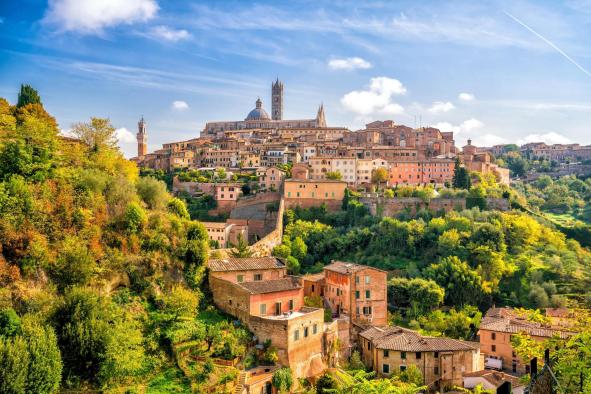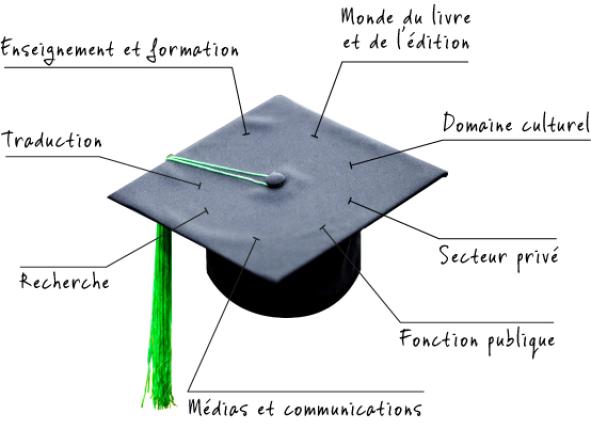Bachelor in French and Romance Languages and Literatures: General
-
Schedule
regular course
- ECTS Credits 180

Your Bachelor's training is based on two complementary approaches: the study of language and the study of literature.
In linguistics, you learn to describe the French language, but also Italian or Spanish, in its various aspects (phonology, morphosyntax, semantics) and understand how these languages have taken shape over the course of history to reach their current state.
In literature, you discover how language enables cultures to define themselves and function through literature. You'll be introduced to text analysis, the history of literary themes and genres, philology and the study of contemporary, modern and medieval French (but also Italian or Spanish) authors.
These courses aim to train a critical mind capable of structuring and interpreting textual, historical and cultural information from a coherent perspective.
Philosophy, history and art history complete your training.

You're off to a good start
- you love the French language and literature;
- you are capable of rigor and precision in analyzing a text;
- you have an excellent command of French, especially spelling.
Teaching methods
Courses, practical work, seminars, group work... everything is done to ensure that you master the language, its history and its culture.
To encourage assimilation of the material seen for each language and literature, theoretical courses are accompanied by hours of practical sessions in small groups.
Literary history is illustrated through novels, plays and short stories in the form of group conversations and personal analysis.
Through regular and varied work in linguistic analysis and literature, you'll get used to defining the main mechanisms of language as well as the various resources of a text with rigor and finesse.
You conclude your bachelor's program with an analytical assignment in one of the course subjects. Completing this assignment is one of the final steps in developing your independence.
Do you enjoy writing?
To hone your writing skills, UNamur offers you, in addition to practice exercises in written French and scientific writing, optional creative writing courses.
These courses are organized in the form of workshops where a theoretical input and targeted exercises feed your creative practice to enable you to apprehend literature "from the inside".
Experience life abroad - an Erasmus bachelor's degree
Thanks to our language courses, your level of Italian or Spanish will improve throughout your training. If your level is good enough, you can study for 4 months in Italy (Universities of Padua, Siena and Perugia), Spain (Universities of Santiago de Compostela, Cadiz and Cáceres), Argentina, Cyprus or Reunion Island.
You also have the option of staying at a Dutch-speaking Belgian university, in Ghent or Antwerp.

Success aids
To help you meet them, UNamur accompanies you in the development of your disciplinary, methodological, human skills... with the support of many professionals.
Preparatory courses, individualized help... Discover the schemes set up for your training.
After the baccalauréat: the master's degree
The bachelor's degree in French and Romance languages and literature gives automatic access, in the French Community, to the master's degree in French and Romance languages and literature.
During this second cycle, you opt for a master's degree that prepares you more specifically for teaching (master en enseignement), research (finalité approfondie) or another professional specialization in the field of books, publishing, IT and linguistics, teaching French as a foreign language, journalism, etc.
-
<unknown>
Code Name Staff Th.+Ex. Credits/Block 1 2 3 LCLAB101 History of Antiquity Flament Christophe Liard Florence 45h th. 3 LHISB001_P35770 <unknown> Hermand Xavier 15h th. 2 2 LHISB004 History of the Middle Ages Hermand Xavier 30h th. 3 LHISB003 History of Modern Times Delleaux Fulgence 30h th. 3 Soft skillsLHISB002 History of the Contemporary Era Tixhon Axel 30h th. 3 -
<unknown>
-
<unknown>
Code Name Staff Th.+Ex. Credits/Block 1 2 3 Soft skillsLELVB001 English 2 (level B1 or higher) Labate Simon 60h th. 4 4 LNRLB207 Introduction to the Dutch language (level B1) Vanparys Johan 30h th. + 30h ex. 4 LELVB002 Nederlands 2 (level B1 of hoger) Miceli Marc 60h th. 4 4 LROMB318 General linguistic issues Vaxelaire Jean-Louis Meurant Laurence 30h th. 4 4 LROMB222 Sign Language Meurant Laurence 30h th. 4 4 -
<unknown>
Code Name Staff Th.+Ex. Credits/Block 1 2 3 LROMB201 Spanish II François Jéromine 15h th. + 60h ex. 8 8 LROMB202 Italian II Palumbo Giovanni Battista 15h th. + 60h ex. 8 8 -
<unknown>
Code Name Staff Th.+Ex. Credits/Block 1 2 3 LPHIB201 General epistemology De Meyer Thibault 30h th. 4 3 LPHIB206_P35690 <unknown> Monseu-Van Cleemput Nicolas 30h th. 4 LPHIB207 Philosophy of art Rizzerio Laura 30h th. 4 4 LPHIB330 Film philosophy Laoureux Sébastien 15h th. 4 LPHIB013 Philosophy, literature and religion Rizzerio Laura 15h th. 4 4 LPHIB203 Social and political philosophy Laoureux Sébastien 30h th. 4 4 -
<unknown>
Code Name Staff Th.+Ex. Credits/Block 1 2 3 LROMB034 Fictional writing I De Mulder Caroline 30h th. 4 LROMB035 Fictional writing II 30h th. 4 LROMB036 Spanish-American literature François Jéromine 30h th. 4 LROMB037 Rhetoric and analysis of audiovisual discourse Vaxelaire Jean-Louis SINTE Aurélie 30h th. 4 LROMB038 The politics of literature Saint-Amand Denis 30h th. 4 LLETB002 History of ancient literature and its legacies Minet Mathieu 30h th. 4 Soft skillsLLETB001 Books and digital culture Leyh Valérie Ruffini-Ronzani Nicolas Pignot Matthieu 30h th. 4 LROMB222 Sign Language Meurant Laurence 30h th. 4 4 LROMB318 General linguistic issues Vaxelaire Jean-Louis Meurant Laurence 30h th. 4 4 LROMB002 Introduction to the language of film Gabriel Jean-Benoît 30h th. 4 4 -
<unknown>
Code Name Staff Th.+Ex. Credits/Block 1 2 3 Soft skillsLELVB001 English 2 (level B1 or higher) Labate Simon 60h th. 4 4 LELVB002 Nederlands 2 (level B1 of hoger) Miceli Marc 60h th. 4 4 LANGB002 Introduction to the English language (level A2) Vanparys Johan 30h th. + 30h ex. 4 LROMB102 Spanish I François Jéromine 15h th. + 60h ex. 8 8 LROMB103 Italian I Palumbo Giovanni Battista 15h th. + 60h ex. 8 8 -
<unknown>
Code Name Staff Th.+Ex. Credits/Block 1 2 3 Soft skillsLELVB001 English 2 (level B1 or higher) Labate Simon 60h th. 4 4 LROMB003 Creative writing 15h th. 4 LELVB002 Nederlands 2 (level B1 of hoger) Miceli Marc 60h th. 4 4 LROMB002 Introduction to the language of film Gabriel Jean-Benoît 30h th. 4 4 LPHIB013 Philosophy, literature and religion Rizzerio Laura 15h th. 4 4 -
<unknown>
Code Name Staff Th.+Ex. Credits/Block 1 2 3 LPHIB207 Philosophy of art Rizzerio Laura 30h th. 4 4 LPHIB206 Metaphysics Monseu-Van Cleemput Nicolas 45h th. 4 LPHIB203 Social and political philosophy Laoureux Sébastien 30h th. 4 4
-
-
<unknown>
-
<unknown>
Code Name Staff Th.+Ex. Credits/Block 1 2 3 LPHIB105 General introduction to philosophy Monseu-Van Cleemput Nicolas De Meyer Thibault De Meyer Thibault 45h th. 4 LHISB101 Religious Studies Hermans Michel 30h th. 3 LPHIB201 General epistemology De Meyer Thibault 30h th. 4 3 -
<unknown>
-
<unknown>
Code Name Staff Th.+Ex. Credits/Block 1 2 3 LROMB202 Italian II Palumbo Giovanni Battista 15h th. + 60h ex. 8 8 LROMB306 History of Italian literature - explanation of texts Palumbo Giovanni Battista 30h th. 3 LROMB308 Grammar - Italian Linguistics Palumbo Giovanni Battista 30h th. 3 LROMB103 Italian I Palumbo Giovanni Battista 15h th. + 60h ex. 8 8 -
<unknown>
Code Name Staff Th.+Ex. Credits/Block 1 2 3 LROMB201 Spanish II François Jéromine 15h th. + 60h ex. 8 8 LROMB305 Historia de la literatura española - Explicación de textos François Jéromine 30h th. 3 LROMB307 Gramática - Lingüística española François Jéromine François Jéromine 30h th. 3 LROMB102 Spanish I François Jéromine 15h th. + 60h ex. 8 8
-
-
<unknown>
Code Name Staff Th.+Ex. Credits/Block 1 2 3 LARTB028 Archaeology and Art History. Contemporary period Leenaerts Danielle 30h th. 3 -
<unknown>
Code Name Staff Th.+Ex. Credits/Block 1 2 3 LROMB218 General Linguistics I Vaxelaire Jean-Louis 30h th. + 15h ex. 5 LROMB231 Historical linguistics of French and Romance languages Vaxelaire Jean-Louis Palumbo Giovanni Battista 45h th. 5 LROMB303 General Linguistics II Vaxelaire Jean-Louis 30h th. 4 LROMB309 Linguistique romane et histoire des langues romanes Palumbo Giovanni Battista 30h th. 4 -
<unknown>
Code Name Staff Th.+Ex. Credits/Block 1 2 3 LROMB226 Language, gestures and signs Meurant Laurence 30h th. 5 Soft skillsLROMB219 Written French Practices II SINTE Aurélie SINTE Aurélie 30h th. 4 LROMB315 Scientific writing SINTE Aurélie SINTE Aurélie 30h th. 7 LROMB104 Synchronic Linguistics of Modern French I Vaxelaire Jean-Louis 30h th. + 30h ex. 5 LROMB120 Synchronic Linguistics of Modern French II Vaxelaire Jean-Louis SINTE Aurélie 30h th. + 30h ex. 5 LROMB117 Practice of written French I SINTE Aurélie SINTE Aurélie 30h th. 5 LROMB123 History of the French language and its grammatical norms Vaxelaire Jean-Louis SINTE Aurélie 30h th. 4 -
<unknown>
Code Name Staff Th.+Ex. Credits/Block 1 2 3 LCLAB009 Introduction to the Latin language Assenmaker Pierre 45h th. + 15h ex. 3 LCLAB007 Reading of Latin texts Assenmaker Pierre 45h th. 3 3 LCLAB003_P35788 <unknown> Assenmaker Pierre 30h th. 3 3 3 LCLAB011_P35790 <unknown> Assenmaker Pierre 30h th. 3 3 3 LCLAB012_P35792 <unknown> Assenmaker Pierre 30h th. 3 3 3 -
<unknown>
Code Name Staff Th.+Ex. Credits/Block 1 2 3 LROMB314 Philology: editing of texts Palumbo Giovanni Battista Lecomte Sophie 15h th. 3 3
-
<unknown>
Code Name Staff Credits Hours/Quarter 1 2 LCLAB101 History of Antiquity Flament Christophe Liard Florence 3 45h th. LHISB004 History of the Middle Ages Hermand Xavier 3 30h th. LHISB003 History of Modern Times Delleaux Fulgence 3 30h th. Soft skillsLHISB002 History of the Contemporary Era Tixhon Axel 3 30h th. -
<unknown>
Code Name Staff Credits Hours/Quarter 1 2 LROMB101 Introduction to literary studies Vrydaghs David 2 15h th. LROMB109 History of French Literature I Vrydaghs David Saint-Amand Denis 5 30h th. LROMB124 History of French literature (19th-21st century) Saint-Amand Denis Vrydaghs David 5 30h th. LROMB125 Introduction to literary analysis Vrydaghs David 5 15h th. + 15h ex. 15h th. + 15h ex. -
<unknown>
Code Name Staff Credits Hours/Quarter 1 2 LPHIB105 General introduction to philosophy Monseu-Van Cleemput Nicolas De Meyer Thibault De Meyer Thibault 4 22.5h th. 22.5h th. LHISB101 Religious Studies Hermans Michel 3 30h th. -
<unknown>
-
<unknown>
Code Name Staff Credits Hours/Quarter 1 2 LROMB103 Italian I Palumbo Giovanni Battista 8 7h th. + 30h ex. 8h th. + 30h ex. -
<unknown>
Code Name Staff Credits Hours/Quarter 1 2 LROMB102 Spanish I François Jéromine 8 7h th. + 30h ex. 8h th. + 30h ex.
-
-
<unknown>
Code Name Staff Credits Hours/Quarter 1 2 LARTB028 Archaeology and Art History. Contemporary period Leenaerts Danielle 3 30h th. -
<unknown>
Code Name Staff Credits Hours/Quarter 1 2 LROMB104 Synchronic Linguistics of Modern French I Vaxelaire Jean-Louis 5 30h th. + 30h ex. LROMB120 Synchronic Linguistics of Modern French II Vaxelaire Jean-Louis SINTE Aurélie 5 30h th. + 30h ex. LROMB117 Practice of written French I SINTE Aurélie SINTE Aurélie 5 30h th. LROMB123 History of the French language and its grammatical norms Vaxelaire Jean-Louis SINTE Aurélie 4 30h th. -
<unknown>
Code Name Staff Credits Hours/Quarter 1 2 LCLAB009 Introduction to the Latin language Assenmaker Pierre 3 22.5h th. + 7.5h ex. 22.5h th. + 7.5h ex. LCLAB007 Reading of Latin texts Assenmaker Pierre 3 30h th. 15h th. LCLAB003_P35788 <unknown> Assenmaker Pierre 3 30h th. LCLAB011_P35790 <unknown> Assenmaker Pierre 3 30h th. LCLAB012_P35792 <unknown> Assenmaker Pierre 3 30h th.
-
<unknown>
Code Name Staff Credits Hours/Quarter 1 2 LHISB001_P35770 <unknown> Hermand Xavier 2 15h th. -
<unknown>
-
<unknown>
Code Name Staff Credits Hours/Quarter 1 2 LPHIB201 General epistemology De Meyer Thibault 4 30h th. LPHIB206_P35690 <unknown> Monseu-Van Cleemput Nicolas 4 30h th. LPHIB207 Philosophy of art Rizzerio Laura 4 30h th. LPHIB330 Film philosophy Laoureux Sébastien 4 15h th. LPHIB013 Philosophy, literature and religion Rizzerio Laura 4 15h th. LPHIB203 Social and political philosophy Laoureux Sébastien 4 30h th. -
<unknown>
Code Name Staff Credits Hours/Quarter 1 2 LROMB034 Fictional writing I De Mulder Caroline 4 30h th. LROMB035 Fictional writing II 4 30h th. LROMB036 Spanish-American literature François Jéromine 4 30h th. LROMB037 Rhetoric and analysis of audiovisual discourse Vaxelaire Jean-Louis SINTE Aurélie 4 30h th. LROMB038 The politics of literature Saint-Amand Denis 4 30h th. LLETB002 History of ancient literature and its legacies Minet Mathieu 4 30h th. Soft skillsLLETB001 Books and digital culture Leyh Valérie Ruffini-Ronzani Nicolas Pignot Matthieu 4 30h th. LROMB222 Sign Language Meurant Laurence 4 30h th. LROMB318 General linguistic issues Vaxelaire Jean-Louis Meurant Laurence 4 30h th. LROMB002 Introduction to the language of film Gabriel Jean-Benoît 4 30h th. -
<unknown>
Code Name Staff Credits Hours/Quarter 1 2 Soft skillsLELVB001 English 2 (level B1 or higher) Labate Simon 4 30h th. 30h th. LELVB002 Nederlands 2 (level B1 of hoger) Miceli Marc 4 30h th. 30h th. LANGB002 Introduction to the English language (level A2) Vanparys Johan 4 30h ex. 30h th. LROMB102 Spanish I François Jéromine 8 7h th. + 30h ex. 8h th. + 30h ex. LROMB103 Italian I Palumbo Giovanni Battista 8 7h th. + 30h ex. 8h th. + 30h ex.
-
-
<unknown>
Code Name Staff Credits Hours/Quarter 1 2 LROMB228 Theory of literature Vrydaghs David 4 30h th. LROMB229 Explanation of French texts from the Middle Ages (Old French) Palumbo Giovanni Battista 5 30h th. LROMB327 Explanations by modern and contemporary French authors Vrydaghs David 4 30h th. LROMB232 Comparative literature De Mulder Caroline 4 30h th. LROMB233 Literary analysis Vrydaghs David Saint-Amand Denis 4 30h th. LROMB330 Explanation of French texts from the Middle Ages (Middle French) Palumbo Giovanni Battista Lecomte Sophie 5 30h th. -
<unknown>
-
<unknown>
Code Name Staff Credits Hours/Quarter 1 2 LROMB202 Italian II Palumbo Giovanni Battista 8 15h th. + 30h ex. 30h ex. -
<unknown>
Code Name Staff Credits Hours/Quarter 1 2 LROMB201 Spanish II François Jéromine 8 7h th. + 30h ex. 8h th. + 30h ex.
-
-
<unknown>
Code Name Staff Credits Hours/Quarter 1 2 LROMB218 General Linguistics I Vaxelaire Jean-Louis 5 30h th. + 15h ex. LROMB231 Historical linguistics of French and Romance languages Vaxelaire Jean-Louis Palumbo Giovanni Battista 5 45h th. -
<unknown>
Code Name Staff Credits Hours/Quarter 1 2 LROMB226 Language, gestures and signs Meurant Laurence 5 30h th. Soft skillsLROMB219 Written French Practices II SINTE Aurélie SINTE Aurélie 4 30h th. -
<unknown>
Code Name Staff Credits Hours/Quarter 1 2 LCLAB007 Reading of Latin texts Assenmaker Pierre 3 30h th. 15h th. LCLAB003_P35788 <unknown> Assenmaker Pierre 3 30h th. LCLAB011_P35790 <unknown> Assenmaker Pierre 3 30h th. LCLAB012_P35792 <unknown> Assenmaker Pierre 3 30h th. -
<unknown>
Code Name Staff Credits Hours/Quarter 1 2 LROMB314 Philology: editing of texts Palumbo Giovanni Battista Lecomte Sophie 3 15h th.
-
<unknown>
Code Name Staff Credits Hours/Quarter 1 2 LHISB001_P35770 <unknown> Hermand Xavier 2 15h th. -
<unknown>
-
<unknown>
Code Name Staff Credits Hours/Quarter 1 2 LELVB001 English 2 (level B1 or higher) 4 30h th. 30h th. LNRLB207 Introduction to the Dutch language (level B1) Vanparys Johan 4 30h ex. 30h th. LELVB002 Nederlands 2 (level B1 of hoger) 4 30h th. 30h th. LROMB318 General linguistic issues Vaxelaire Jean-Louis Meurant Laurence 4 30h th. LROMB222 Sign Language Meurant Laurence 4 30h th. -
<unknown>
Code Name Staff Credits Hours/Quarter 1 2 LROMB201 Spanish II François Jéromine 8 7h th. + 30h ex. 8h th. + 30h ex. LROMB202 Italian II Palumbo Giovanni Battista 8 15h th. + 30h ex. 30h ex. -
<unknown>
Code Name Staff Credits Hours/Quarter 1 2 Soft skillsLELVB001 English 2 (level B1 or higher) Labate Simon 4 30h th. 30h th. LROMB003 Creative writing 4 15h th. LELVB002 Nederlands 2 (level B1 of hoger) Miceli Marc 4 30h th. 30h th. LROMB002 Introduction to the language of film Gabriel Jean-Benoît 4 30h th. LPHIB013 Philosophy, literature and religion Rizzerio Laura 4 15h th. -
<unknown>
Code Name Staff Credits Hours/Quarter 1 2 LPHIB207 Philosophy of art Rizzerio Laura 4 30h th. LPHIB206 Metaphysics Monseu-Van Cleemput Nicolas 4 45h th. LPHIB203 Social and political philosophy Laoureux Sébastien 4 30h th.
-
-
<unknown>
Code Name Staff Credits Hours/Quarter 1 2 LROMB301 History of French literature De Mulder Caroline 4 30h th. LROMB310 Moyen français : lectures et commentaires de textes Palumbo Giovanni Battista Lecomte Sophie 4 30h th. LROMB317 French modern authors II Vrydaghs David 4 30h th. LROMB312 Romance literature François Jéromine François Jéromine 4 30h th. LROMB313 Belgian French-language literature De Mulder Caroline 4 30h th. -
<unknown>
Code Name Staff Credits Hours/Quarter 1 2 LPHIB201 General epistemology De Meyer Thibault 3 30h th. -
<unknown>
-
<unknown>
Code Name Staff Credits Hours/Quarter 1 2 LROMB306 History of Italian literature - explanation of texts Palumbo Giovanni Battista 3 30h th. LROMB308 Grammar - Italian Linguistics Palumbo Giovanni Battista 3 30h th. -
<unknown>
Code Name Staff Credits Hours/Quarter 1 2 LROMB305 Historia de la literatura española - Explicación de textos François Jéromine 3 30h th. LROMB307 Gramática - Lingüística española François Jéromine François Jéromine 3 30h th.
-
-
<unknown>
Code Name Staff Credits Hours/Quarter 1 2 LROMB303 General Linguistics II Vaxelaire Jean-Louis 4 30h th. LROMB309 Linguistique romane et histoire des langues romanes Palumbo Giovanni Battista 4 30h th. -
<unknown>
Code Name Staff Credits Hours/Quarter 1 2 LROMB315 Scientific writing SINTE Aurélie SINTE Aurélie 7 30h th. -
<unknown>
Code Name Staff Credits Hours/Quarter 1 2 LCLAB011_P35790 <unknown> Assenmaker Pierre 3 30h th. LCLAB003_P35788 <unknown> Assenmaker Pierre 3 30h th. LCLAB012_P35792 <unknown> Assenmaker Pierre 3 30h th. -
<unknown>
Code Name Staff Credits Hours/Quarter 1 2 LROMB314 Philology: editing of texts Palumbo Giovanni Battista Lecomte Sophie 3 15h th.
Les métiers des romanistes

Romanist professions
Although graduates in French and Romance languages and literature are very often destined to become French teachers, they can put their skills to good use in many other, sometimes unexpected, professional fields.
Teaching and training
Many Romanists share their expertise and passion for French language and literature with secondary school students. But Romanists are also involved in other training contexts with a variety of audiences: they become teachers of French as a foreign language, Spanish or Italian, communication or literacy trainers, for example. They can be found in Hautes Écoles, private language centers, continuing education organizations, associations active in socio-professional integration, or sometimes within certain large companies.
Within the framework of bilateral agreements signed by the Wallonia-Brussels Federation, the WBI (Wallonia-Brussels International, the public administration in charge of international relations) coordinates a network of French language trainers in several European countries and even in Louisiana. Dozens of young Romanists thus spend a few years abroad as readers of French language and literature in a university or a school for translators-interpreters, as trainers in a bilingual lycée, or as French language assistants in a secondary school, helping to promote Belgium's French culture in the broadest sense (literature, history, institutional system...).
Cultural professions
Romanists can work in the full range of book-related professions, from proofreading to publishing management, promotion and literary translation. They can work in publishing houses, libraries, bookshops, documentation centers or as freelancers. Thanks to their open-minded training in the major artistic movements, some Romanists manage cultural projects in institutions such as Maisons de la culture, theaters...
My mission is to bring young audiences to the Opéra royal de Wallonie, a role in which I value my previous experience as a teacher. I organize workshops and visits for children, prepare educational sheets for teachers, promote our activities... I enjoy keeping the link with cultural works since my studies in Romance.
Florent
I've been working for an international scientific publishing house for several years. As a production manager, I was responsible for the process from manuscript receipt to printing. Today, I manage our Brussels head office. As well as managing the company in the strict sense of the word, I look for new projects and create and develop collections. Being a publisher means more than just reading manuscripts. The photographic view is favored most of the time because the text is apprehended as an object to be processed, finalized, published... Being able to combine social contact with management activities while working on the text, in short, participating in the implementation of a publishing project is exciting.
Emilie
Media and communication
By opening up to the socio-economic world or specializing in a particular cultural field, Romance scholars can put their skills to work in the media (television, print media...). Today, many of our graduates are journalists, literary critics or editors of company newspapers. Some go on to jobs directly linked to communications: press attachés, project managers in advertising...
I'm an account executive in a major advertising agency. My job is to act as a relay between the client and our agency. I have to make sure that the project runs smoothly. Multilingualism is an asset for working with a more diverse and larger client base.
David
Research
Some Romanists pursue research after graduation, often supplemented by teaching duties, in Belgium and sometimes abroad. Universities and public funds (e.g. FNRS) can finance the completion of a doctorate. Doctors of Philosophy and Letters then have the opportunity to teach at university. Research carried out by Romanists focuses on the history of French literature, comparative arts, Romance language didactics, language...
A social life to develop
When it comes to landing a first job, the personality of candidates is often as important as their university degree, hence the importance of keeping one's curiosity alive throughout one's studies, and building a rich social life, for example by getting involved in the associative world. Young Romanists can expect to follow a sometimes winding career path, especially in the early years...
But it's often in these detours that creative, curious personalities and those driven by an entrepreneurial spirit will discover the profession they're passionate about. Some Romanists continue their studies with further training (communications, languages, IT, management, etc.), which can facilitate their professional integration in specialized sectors of activity.